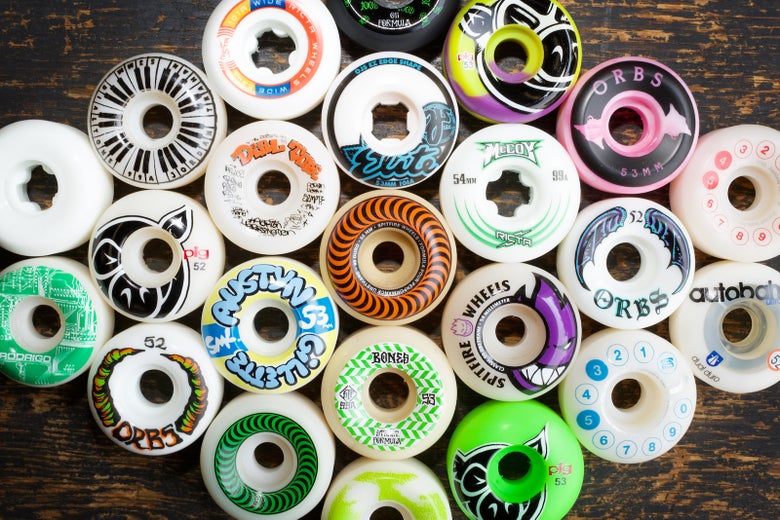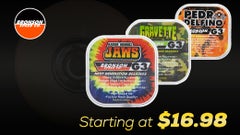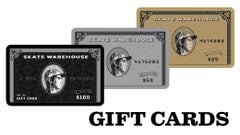How To Choose Skateboard Wheels
Street, park, cruisers, longboards and more - buy the right wheels for your skateboard! Shop the best wheels for all your skating needs based on our recommendations for wheel size, durometer (how hard the wheel is), and shape.

Choosing a set of wheels is determined by how and what you like to skate. Whether you want to skate street, parks, or just cruise around, there’s a skateboard wheel for you. Below you’ll find a comprehensive guide of different types of wheels and which one will best keep you rolling.
Wheel Size
Generally, wheel sizes vary from 48-75mm and are measured across the wheel in diameter. A lower millimeter wheel is usually preferred for street skating, as they are lighter for flip tricks but more difficult to ride on rougher surfaces. The most popular street skating wheel sizes are between 52-54mm.
A larger wheel helps you skate rougher ground and ride up transitions easier. You can still skate street with larger wheels, but it will result in your skateboard feeling heavier. Wheels between 55-58mm are great for skating slightly rougher terrain or for skating bowls and ramps at a skatepark.
Wheels 59mm and larger are usually used for cruiser boards, where you are more focused on riding and not as concerned with doing flip tricks. The wheel is heavier but also covers more surface area, making it faster when riding.
Style |
Recommended Size Range |
| Street | 52mm - 54mm |
| Park | 55mm - 58mm |
| Cruiser | 59mm and up |
How To Choose Skate Wheels | Size
Durometer
The hardness of a wheel is referred to as the durometer and is important in finding the right skateboard wheel for you. The higher the durometer number, the harder the wheel is. The lower the durometer number, the softer the wheel is. Most brands measure durometer on the “A Scale”, but Bones occasionally uses an alternative “B Scale” method. According to Bones, an 84B wheel is the same as a 104A wheel.
For most street skating, wheels with a durometer rating of 99a and up are preferred. Harder skate wheels are more responsive, slide easier, and hold speed better on smooth surfaces. They absorb less energy than their softer counterpart, making it preferential for popping and flipping tricks. Tricks like noseslides and tailslides will also slide much easier with harder wheels because there is less wheel resistance against the ledge.
Soft wheels with a durometer rating of 78a-87a are great for cruising, filming, and going through rough terrain. If you use your skateboard primarily for transportation or non-trick related usage, these are for you. A softer wheel will roll over hazardous objects easier while offering more grip and control. Soft wheels are also preferred for filming clips, as they are quieter, require less pushing, and make it easier to keep up with whoever you are filming. In certain situations a soft wheel is preferred for trick skating. For instance, if you’re skating a rougher spot like a drainage ditch, an 87a wheel can help you ride smoothly up a rugged bank in comparison to a 101a wheel.
Wheels in the 90a to 97a range are less common, but are considered to be a good “all-around” wheel. Not particularly hard or soft, these wheels are good for transitioning between cruising the streets and cruising in parks.
Check out our recommendation for best wheels depending on how you skate:
Hardness / Durometer Range |
Benefits |
| Soft (78 - 87a) | Better for rough surfaces |
| Medium / All Around (90a - 97a) |
Best mix of speed and control |
| Hard (99a and up) | Used for street/trick skating |
How To Choose Skate Wheels | Durometer
Wheel Shape
Wheel shape is important because it can affect they way you skate. Things you want to look for when finding the right shape are:
- Wheel width
- Riding surface
- Cut of the wheel
The width of the wheel is measured in millimeters and it'll be the distance between each edge of the wheel. The riding surface is the area between each edge of the wheel that is actually touching the ground. The shape of the wheel is how the wheel is cut.
The two most popular wheel shapes are classic and conical. Classic wheels have a traditional wheel look with a rounded shape on the sides. Classic wheels generally have a narrower riding surface, which offers more speed when street skating. Conical wheels include a larger riding surface and cut sides that don’t stick out as much as classic wheels. The cut sides on a conical wheel offer less weight and are also easier to lock in to grinds.

